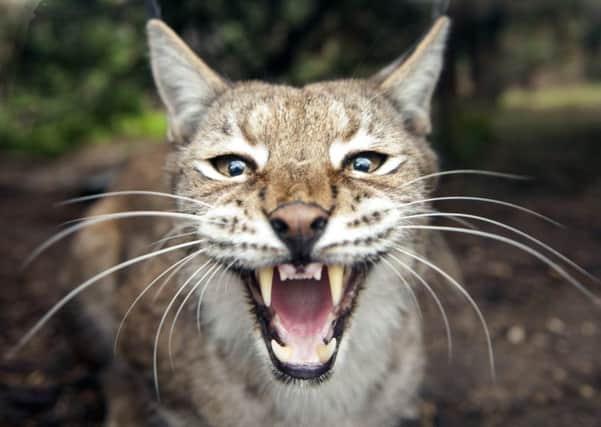Opposition growing over release of lynx into the wild
This article contains affiliate links. We may earn a small commission on items purchased through this article, but that does not affect our editorial judgement.


Speaking to a packed meeting at Otterburn near Kielder Forest, where the Lynx Trust has proposed releasing six animals, John Bruce said there were many reasons against the project going ahead.
• READ MORE: Farming news
Representing the British Deer Society (BDS), he pointed out that there was no conservationist reason for bringing the lynx back – as it is not considered to be at risk with a healthy population in more remote parts of Europe.
Advertisement
Hide AdAdvertisement
Hide AdHe then argued that bringing in six animals went against their welfare as research carried out by the BDS had shown that a much larger population of more than 200 lynx was required to give a sufficiently large genetic pool to be viable in the long term.
Bruce quoted from the BDS research, which estimated that a lynx would kill the equivalent of one roe deer per week. When the deer population fell as a result of this predation, he said it would provide impetus for the lynx to move further afield, adding that lynx can travel up to 100 kilometres on their own volition.
Other imported species such as sea eagles and beavers had quickly spread from their original release areas and were now causing problems on a much wider front, he claimed.
The original application to release the lynx has gone to English Nature but because the Kielder Forest lies on the border with Scotland, Scottish Natural Heritage will also be consulted over the project.
Bruce indicated the BDS would be making representations to both organisations.
Georg Milne of the NSA, which organised the meeting, said he was encouraged by the breadth of opposition to the project.
Phil Stocker, NSA chief executive, said: “The UK’s ecology is built on huge diversity which is dependent on human management and farming in the majority of cases.”
Advertisement
Hide AdAdvertisement
Hide AdHe added that “without some predator control” there could be a “collapse of iconic birds and mammals such as the red squirrel and the curlew”.
“The UK is very different from countries where top-level predators such as big cats can survive, in terms of land use, wildlife and our population and infrastructure,” he said.
“Lynx are known to prey on ground nesting birds and small mammals and we are in danger of risking investment which has gone into making sure they have a future.”
Share farming put to the test
Entry into farming does not necessarily mean buying or renting a property, said NFU Scotland, which is initiating a research project on the potential of share faming. The union believes this system would assist both new entrants and farm owners worried about succession.
Speaking after a New Generation committee meeting in Perth, NFU Scotland’s food policy and campaigns officer, Lindsey Macdonald, said: “We recently launched this project after it became clear that there were mutually beneficial issues among farmers and crofters at both ends of their career that had yet to be explored.
“On the one side, we have a generation of new and enthusiastic young farmers and crofters desperate to enter the industry and build their business; on the other side, we have a huge number of farm and croft owners reaching retirement age.
“They are looking to step back but with no willing family members to take over and a fear that the only choice they have is to sell the farm they’ve spent their whole lives building up.”
Macdonald added: “We realised there’s a unique opportunity to tap into this and match new entrants with farm owners via share farming. Share farming is an arrangement in which the new entrant and the farm owner carry out separate farming businesses on the same land with one party providing the land and often the machinery and the other providing the labour and expertise, while both share the profits.
Advertisement
Hide AdAdvertisement
Hide Ad“Each arrangement will be different according to the parties involved but this is an exciting opportunity for new entrants and farm owners alike to mutually benefit one another.”